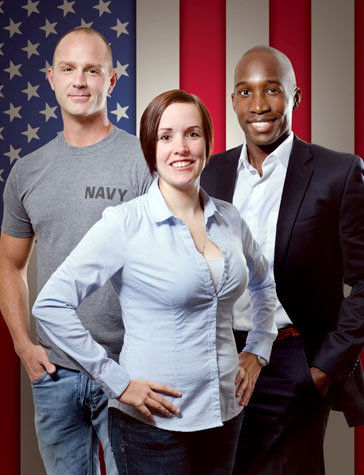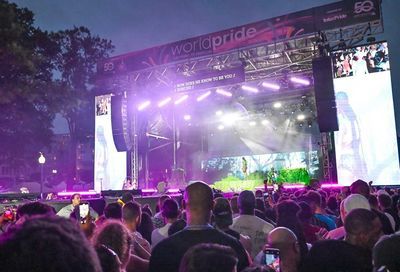Call of Duty
On the anniversary of DADT's repeal, three active-duty servicemembers tell their stories
In July, underneath a warm Californian sun, dozens of servicemembers holding American flags marched through the streets of San Diego.
On its surface, the sight wasn’t entirely unusual. But this parade was different. These active-duty troops were gay, and for the first time in American history they had been permitted by the Pentagon to march in full uniform in an LGBT pride parade.

Chief Petty Officer Ronnie Ratliff, Navy; Jennifer Pollom, Army; Sgt. John Cephas, Maryland National Guard
(Photo by Julian Vankim)
The military contingent attracted some of the loudest cheers from onlookers, particularly when a Navy officer dropped to one knee alongside the parade route and proposed to his boyfriend.
Few could have imagined such an event just a few years ago.
Sept. 20 marks the one-year anniversary of the end of ”Don’t Ask, Don’t Tell.” Despite dire predictions from some opponents a year ago, the American military has not faltered by allowing gay and lesbian servicemembers to serve openly.
As the repeal enters its second year, most assessments from inside and outside the armed forces concur: The military remains as strong as ever.
In the first year since the ban’s repeal, there have been a number of firsts as military men and women have been able to say who they love without fear of persecution. From the LGBT pride parade in San Diego to the reinstatement of the some of the 13,000 gay men and women discharged since the ban was enacted in 1993, the military has embraced gay and lesbian troops.
In June the Pentagon hosted its first event honoring gay and lesbian servicemembers. That same month two men became the first same-sex couple married on a military base.
Just last month, Army Reserve officer Tammy Smith was promoted to brigadier general, becoming the highest-ranking out military officer and first out, active-duty general in American history. Smith’s wife, Tracey Hepner, presented her with her stars.
A recent study by the Palm Center of the Williams Institute at the University of California, Los Angeles, School of Law found no negative impact whatsoever on the military from ending the discriminatory ban on out gay servicemembers.
According to the first academic study of the repeal, the end of DADT has not resulted in any consequences for military readiness, cohesion, recruitment, retention, assaults, harassment or morale. The Palm Center’s study, which found that ”greater openness and honesty resulting from repeal seem to have promoted increased understanding, respect and acceptance,” agrees with the Defense Department’s own evaluations.
Moreover, only two servicemembers, both of whom were chaplains, have left the military as a result of the repeal.
That is not to say hurdles do not still remain for gays and lesbians in the military. Although there appear to be no service-wide patterns of harassment, 11 percent of active-duty respondents in the study mentioned disturbing incidents of anti-LGBT sentiment.
Activists continue to pressure President Barack Obama to sign an executive order that would prohibit harassment and discrimination within the ranks and allow for servicemembers to report incidents outside their chain of command.
It remains unclear if the president will sign such an executive order anytime soon. A senior Obama administration official told Metro Weekly that the Department of Defense has actively reinforced clear antidiscrimination policy guidance since repeal and stated that harassment based on sexual orientation is unacceptable.
As more and more servicemembers marry their partners, they are discovering discrimination written into military code that prohibits recognition of same-sex spouses. The 1996 Defense of Marriage Act has added to this problem, forbidding federal recognition of same-sex marriages and blocking benefits enjoyed by straight military couples.
Rep. Adam Smith (D-Wash.), the ranking member of the House Armed Services Committee, has introduced a bill to alter that military code, but it remains to be seen when such legislation will gain traction in the Republican-controlled House of Representatives. Even if DOMA is declared unconstitutional by the Supreme Court, military code will need to be rewritten before the military formally recognizes same-sex marriage.
”I think we’re already seeing that military leaders are increasingly uncomfortable with this two-tiered system of support,” said Zeke Stokes, communications director for the Servicemembers Legal Defense Network. ”It’s hard to argue that these Americans who put their lives on the line for their country are second-class citizens.”
Nevertheless, some opponents continue to fight against equality. In July, Rep. Steve King (R-Iowa) sought to ban same-sex weddings on military bases, arguing that Obama was violating the Defense of Marriage Act by allowing military chaplains to perform same-sex weddings at military installations. On Sept. 11, Republican Sens. Jim Inhofe (Okla.) and Rodger Wicker (Miss.) introduced legislation that would ban same-sex weddings on military bases.
Nevertheless, their battle remains a tired one. Republican presidential candidate Mitt Romney has said he does not plan to reverse the ban if he wins the election. And while some Republicans on Capitol Hill continue to support a ban on out servicemembers, the likelihood of such a policy once again becoming law diminishes with each passing day.
As Obama declared at the signing ceremony of the repeal in December 2010, ”We are not a nation that says, ‘Don’t ask, don’t tell.’ We are a nation that says, ‘Out of many, we are one.”’
Continue reading ”Call of Duty”:
- The Fearless Sergeant
Sgt. John Cephas, Maryland National Guard - This Gay Woman’s Army
Jennifer Pollom, Army - A Sailor’s Life, No Longer at Sea
Chief Petty Officer Ronnie Ratliff, Navy - Seaside Celebration
Crowd marks the one-year anniversary of DADT’s end at Intrepid Museum gala - No Military Welcome for Transgender Americans
Support Metro Weekly’s Journalism
These are challenging times for news organizations. And yet it’s crucial we stay active and provide vital resources and information to both our local readers and the world. So won’t you please take a moment and consider supporting Metro Weekly with a membership? For as little as $5 a month, you can help ensure Metro Weekly magazine and MetroWeekly.com remain free, viable resources as we provide the best, most diverse, culturally-resonant LGBTQ coverage in both the D.C. region and around the world. Memberships come with exclusive perks and discounts, your own personal digital delivery of each week’s magazine (and an archive), access to our Member's Lounge when it launches this fall, and exclusive members-only items like Metro Weekly Membership Mugs and Tote Bags! Check out all our membership levels here and please join us today!

























